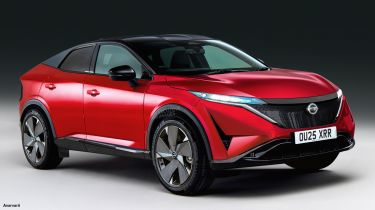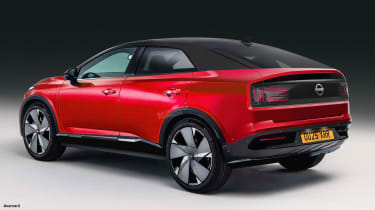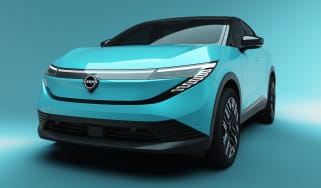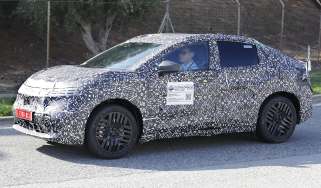New Nissan Leaf to be reinvented as a crossover
The popular Nissan Leaf electric car will morph into a crossover and our exclusive images preview how it could look
Nissan has confirmed that its Leaf electric hatchback will be replaced by an all-new crossover. The model is earmarked to lead the development of the firm’s Sunderland plant as an EV hub from the middle of this decade.
The Japanese manufacturer announced earlier this year that it is investing around £1billion in the site in the North East, and that a new EV would be produced to take batteries that will be produced at a new factory being built next door.
Our exclusive images show what Nissan’s new Leaf-replacing crossover could look like, with the new model set to feature many design elements from the production-ready Ariya electric SUV.
A teaser image of the crossover was revealed at the time of its announcement, but it didn’t make it clear if the crossover – which appears to have a slightly raised ride height and a coupé-style roofline with a sharply angled tailgate – would be sold alongside a successor to the current Leaf, introduced in 2017, or be its replacement.
Now Nissan’s European boss Guillaume Cartier has confirmed that the brand has no plans for a new Leaf hatchback. “We will be crossover, and we will be electrified,” he told Auto Express. “By 2023, 75 per cent of our cars will be electrified, one way or another, and by 2025 that figure will be 100 per cent. We are aiming to have 80 per cent of our sales volumes pure electric by 2030. We will have Juke, Qashqai and then the new car that will be based in Sunderland.”
When asked directly if the car would sit alongside the Leaf in the range, Cartier said, “It will replace it. It will be the new platform, but the shape will be different.” He did not specify if the Leaf name would continue or if Nissan will choose to switch badges.
Either way, the decision means that by the middle of this decade, Nissan will have left all conventional hatchback markets altogether – with the possible exception of small models, if it decides to build a regular supermini to follow the Micra.
The crossover will be based on the Renault-Nissan Alliance’s CMF-EV platform, which has been designed to maximise the packaging benefits of a pure-electric powertrain. The first car to use this set-up will be the new Renault Megane E-Tech Electric, which will go on sale in early 2022 with a choice of power outputs and battery capacities offering up to 292 miles of range.
Given the platform tech, it’s likely that Nissan will share battery components with Renault, and beyond the common chassis parts, the car is also likely to feature the same Android Automotive infotainment system as the Megane. The Alliance as a whole announced in 2018 that it had agreed a deal with Google to use the tech giant’s software.
Cartier said that the UK plant’s strong history was the key factor in its success in securing the deal to make the new model. “The heritage was why Sunderland was selected,” he said. “The demonstration of what this factory is able to do – having Leaf already, the e-NV200 [van] – this expertise, the capacity for innovation. That’s the reason why we’ve been able to build the future.”
Click here for our list of the best electric cars on sale right now…
Find a car with the experts










